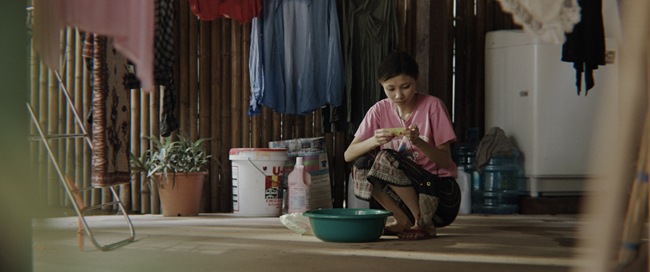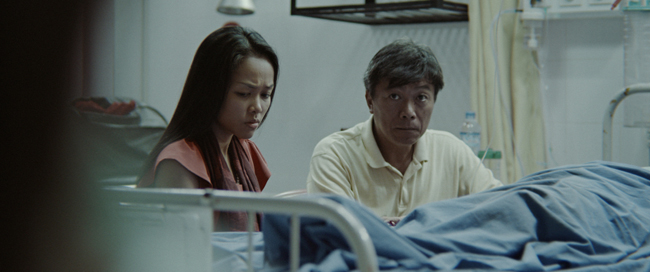La Fabrique des Cinemas du Monde in Cannes Film Festival
Hashimoto: What did it mean to you to participate in that program in Cannes?
Do: I could not be the filmmaker that I am today if I didn't go to there. The workshop was eye-opening. It taught me how to be a filmmaker. There was also networking, pitching, and sales; it taught me everything from the beginning to end. This workshop also introduced me to a wide variety of filmmaker styles, so I really grew from it. As for script, because Cannes is very serious festival, many people asked, "Does it have to have ghosts? You obviously have an underlying social drama in here." This was the only time in which I became very demanding, like in a French auteur I suppose, and insisted that yes, it had to have ghosts. I mean, we are Lao. It would not be Lao without those ghosts. *3
*3 This is a characteristic of Lao culture. Lao people believe in the existence of invisible supernatural presences, such as ghosts and spirits.

Hashimoto: According to the interview that I read, you faced harsh competition, especially among women in film industry, before coming to Laos. Isn't this part of your own experience reflected in Dearest Sister?
Do: I suppose with female characters, yes, the way in which the females treat each other is very real. Like Mimi, Ana, and Nok, the relationship between all the women in that film reflects general life, not film crew mentality. I love the dynamic between Mimi and Ana because Mimi is so high class; she doesn't need a foreign man, much less any man, she drives a $150,000 Lexus, she eats caviar and drinks champagne in a gourmet restaurant, and while she likes her friend, Ana, who is cute, Ana is just so middle class compared to her. Even though Ana is a very typical middle-class Lao woman, in a way she has elevated her situation by being married to a white man for uncommon reasons, not for the purposes of getting a foreign passport or social climbing. I believe as a director that the relationship with Jakob and Ana is genuine. They didn't love each other for those stereotypical reasons most people expect from a developing world woman. But one of the reasons why Ana is so insecure all the time is that she can't help thinking of what other people think about her.

Do: Mimi probably just thinks Jakob married Ana because she is cute, but Nok, the maid and the neighbor, definitely think that Ana married a white man for common reasons, which is why Nok tries to go to hooker bars to find herself a foreign husband and "raise her status" to be like Ana. The neighbor who is always listening to the radio says to Nok, "Isn't that what your sister did? Look at her, I guess he gives her money all the time and buys her nice things. How lucky she is." So, of course Ana is insecure and feels strange about that, which makes her situation in the film is very tenuous.

Depicting Lao Reality
Hashimoto: I understand that the theme you depicted in Dearest Sister is universal, not only seen in Laos. However, the details of the Lao society that you depicted were so specific and very real. I often hear that young women living in Vientiane talk about wanting to marry a white man or a man from an advanced country. I also think that they want to leave the country.
Do: I am sure some do. It maybe the initial desire to have a foreign passport because they believe that going to a place like, for instance, Japan or America or Canada or somewhere different would increase their opportunities for a larger salary or maybe they would be treated like a princess by their husbands because they are from different cultures. I think that is the initial desire and a lot of it is also very materialistically driven, too. I think there are many different factors.
Hashimoto: Ana in Dearest Sister wants to remain in Laos, but on the other hand, women in Laos want to emigrate to a foreign country after marrying a white man.

Do: Right, but have you noticed they always come back? Everything looks fresh during the first few years; it's fun. But after a while, they realize this is not their society, not their own culture. And then, they miss their lives in Laos and come back. Even if her husband doesn't want to return, a pregnancy is a good reason for a wife to go back home because she needs her mother, her family, and her community structure to help her to raise her child. So Ana is a little different because she has no desire to leave Laos, because while she understands it, she doesn't really speak English and she is not really interested in integrating with her husband's society. And I am sure she is intimidated by going a country in which she doesn't really speak the language or know the culture. One of the things I really liked about Ana's relationship is that she didn't want to leave in the first place. I pushed on that. Because people usually want to leave Laos, and then they just end up returning. I just removed that initial desire to want to leave at all from Ana's character.
Next Project
Hashimoto: I thought Dearest Sister included some criticism about NGO activities in Laos. What was that point about?

Do: The NGO topic is for our next film. I think NGOs do great work. We are obviously an underdeveloped country and the NGOs' purpose here is to help us develop. Sometimes, though, it feels extreme when it goes too far. There are so many foreign NGOs coming in with short-term projects. For instance, it's ridiculous to think that people from a Japanese organization are sent to Laos and can find a solution by just staying here for two months, especially these young ones with bright eyes who think "I am going to save these Third World people." If they are really here to help, they maybe need to take the time to analyze effective solutions and understand when and what our people need or don't need.
Another thing is when NGOs make decisions for us, they believe they are like saviors. It is a very toxic system. But it is a cycle not only with the NGOs, but also our people. Therefore, it is quite hard to change. I appreciate much of the work that NGOs do and I think that we need it, but we also need to start figuring out for ourselves how to be self-sustaining. The next film is very much a commentary on this issue, except the government has asked me to turn the NGO into a private company, so I will do that, since I want to make a film.
Hashimoto: Have you already finished writing the script for the next film, The Long Walk?
Do: Yes, it's finished. I am already in production. It is a lot about decisions – about regret, and the repercussions of making decisions for other people against their will and how that can affect a person on a very micro level. It's also about development and how it is so uneven in Laos. I remember after we shot the opening scene for Dearest Sister, I thought about what Laos is going to look like in 50 years, which is where the idea came from for the next film.
Hashimoto: I am looking forward to your next film. Thank you very much.

[On July 21, 2018 at the Japan Foundation Asia Center, Tokyo]
More Information
Chanthaly Official Trailer
Dearest Sister Official Trailer
La Fabrique des Cinemas du Monde
Interview and text :Sayaka Hashimoto
Sayaka Hashimoto is an assistant professor at Tokyo Zokei University. She obtained her PhD in Anthropology from the Graduate School of Human Sciences, Waseda University, after conducting field research in Laos between 2005 to 2009. Her specialty is Sport Anthropology and Lao studies. Hashimoto's current research interests are sports policies for ethnic minorities in Laos, and representation of Lao society and culture by Lao films. In March 2018, she was responsible for the planning and management of Laos' part in the three country (Cambodia, Laos, and Thailand) circuit symposium "Literature, Film, and Culture in Southeast Asia" organized by Cine Adobo.
Photo: Motoi Sato






